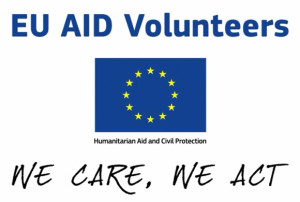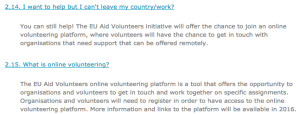 If your organization or initiative is based in Europe, in a country that is a part of the European Union, and is also working in humanitarian action or civil protection or volunteer engagement, you can take a free online course to explore becoming an EU Aid Volunteers sending organization. The course will run from 2-29 May 2016, with participants logging on for approximately 3 hours per week for lessons, webinars and discussions. There is a limit of one participant per organization. Space is limited and will be allocated on a first come, first served basis!
If your organization or initiative is based in Europe, in a country that is a part of the European Union, and is also working in humanitarian action or civil protection or volunteer engagement, you can take a free online course to explore becoming an EU Aid Volunteers sending organization. The course will run from 2-29 May 2016, with participants logging on for approximately 3 hours per week for lessons, webinars and discussions. There is a limit of one participant per organization. Space is limited and will be allocated on a first come, first served basis!
This E-Learning course was created by the consortium formed by Volonteurope,
Alianzapor la Solidaridad, GVC Onlus and Hungarian Baptist Aid in partnership with Instituto de Estudios Sobre Conflictos y Acción Humanitaria (IECAH). At the end of the course participants will acquire:
- The ability to describe how the EU Aid Volunteers programme provides a central framework for strengthening local capacity and resilience in disaster-affected communities; and
- The ability to explain the principles and values of Humanitarian Action along with other key aspects of humanitarian work.
The course ultimately “seeks to provide flexible, practical and up-to-date training on the value of volunteers in humanitarian action.”
Every participant will have the chance to communicate with facilitators and other participants to discuss questions, problems, and opinions. The main forum will be used for introductions, general discussion, and debates, and to “really take advantage” of the course, regular participation in the forums is considered fundamental.
If you participate in this online course, I would LOVE to hear from you – about what you learned, how you liked it, what you hope to do with your knowledge, etc.
The EU Aid Volunteers initiative is managed by the EU Humanitarian Aid and Civil Protection department (ECHO). I was involved in creating the virtual volunteering strategy for the EU Aid Volunteers initiative as a consultant. Here is more information about my consulting experience.

